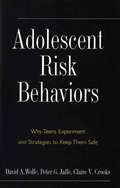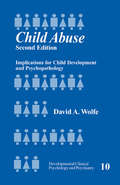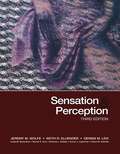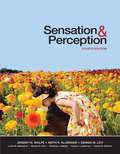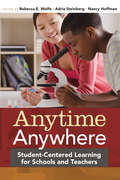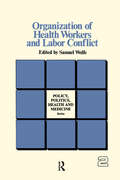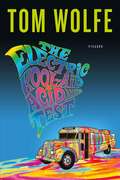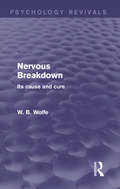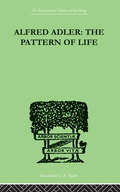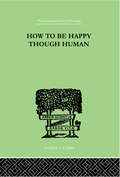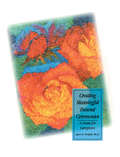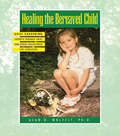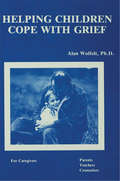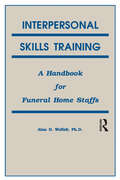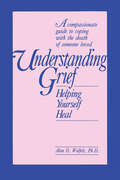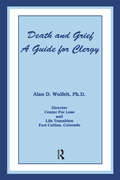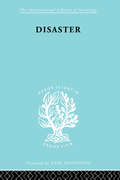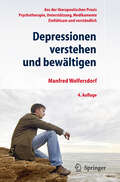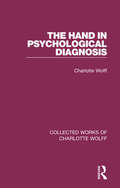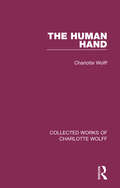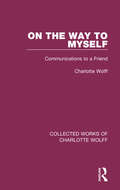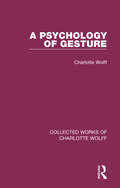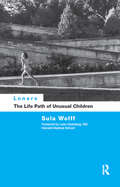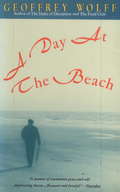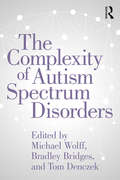- Table View
- List View
Adolescent Risk Behaviors: Why Teens Experiment and Strategies to Keep Them Safe
by David A. Wolfe Claire V. Crooks Peter G. JaffeThis book focuses on the crucial role that relationships play in the lives of teenagers. The authors particularly examine the ways that healthy relationships can help teens avoid such common risk behaviors as substance abuse, dating violence, sexual assault, and unsafe sexual practices. Addressing the current lack of effective prevention programs for teens, they present new strategies for encouraging healthy choices. The book first traces differences between the "rules of relating" for boys and girls and discusses typical and atypical patterns of experimentation in teens. The authors identify the common link among risk behaviors: the relationship connection. In the second part of the book, they examine the principles of successful programs used by schools and communities to cultivate healthy adolescent development. An illuminating conclusion describes the key ingredients for engaging adolescents, their parents, teachers, and communities in the effort to promote healthy, nonviolent relationships among teens.
Child Abuse: Implications for Child Development and Psychopathology
by Dr David A. WolfeThis Second Edition of Child Abuse is devoted to a topic of major social and clinical significance. In this book, the author describes the different types of abuse and discusses the influence they have on development and social consequences in childhood and adolescence. The book uses theory and research to convey the importance of multiple contextual influences that affect abuse and can be used to ameliorate it.
Sensation and Perception (Third Edition)
by Jeremy M. Wolfe Keith R. Kluender Dennis M. Levi Linda M. Bartoshuk Rachel S. Herz Roberta Klatzky Susan J. Lederman Daniel M. MerfeldThe book provides comprehensive descriptions of the science behind vision, hearing, touch, smell and taste.
Sensation & Perception (Fourth Edition)
by Jeremy M. Wolfe Keith R. Kluender Dennis M. Levi Linda M. Bartoshuk Rachel S. Herz Roberta Klatzky Susan J. Lederman Daniel M. MerfeldSensation & Perception is written by experts in each of the five senses who have a passion and enthusiasm for conveying the excitement of this field to students. Each of the 15 chapters of this book tells a coherent and interesting story that gives the reader enough background and exposure to enough current research to understand why these topics are interesting and how they might be further investigated and understood.
Anytime, Anywhere: Student-Centered Learning for Schools and Teachers
by Rebecca E. Wolfe Adria Steinberg Nancy HoffmanAnytime, Anywhere synthesizes existing research and practices in the emerging field of student-centered learning, and includes profiles of schools that have embraced this approach. Educators have argued that students should be at the center of learning, constructing new knowledge based on what is interesting to them, and receiving guidance in classrooms—or anywhere they may happen to be— from adults with whom they have positive relationships. Now, with the advent of new technologies, researchers are confirming the value of this approach by showing how the human brain and memory work in response to different environments, and how digital tools give students powerful new ways to express what they&’ve learned."
Organization of Health Workers and Labor Conflict (Policy, Politics, Health and Medicine Series)
by Samuel WolfeOffers insights into such contemporary issues as health workers' unions, labor conflicts in health care facilities, and underlying class and class related sex and ethnic conflicts that beset the health sector.
The Electric Kool-Aid Acid Test
by Tom WolfeWolfe takes a walk on the wild side with Ken Kesey and his Merry Pranksters and writes about the 1960s hippie culture.
Nervous Breakdown: Its Cause and Cure (Psychology Revivals)
by W. B. WolfeOriginally published in 1934, excerpts from the original preface read: "A Nervous breakdown is a terrifying experience. When it occurs, the patient, his family, and often his friends are panic-stricken. No one knows just what to do with the patient, and the patient is incapable of helping himself. … What should be done? If you think you have a nervous breakdown, it is your first duty to consult a competent and reputable physician, preferably your family doctor, and get a thorough and complete physical examination. If you cannot find any evidence of physical or organic disease, ask your doctor to recommend a reputable psychiatrist or medical psychologist. …This is a compact manual of help and self-help." Today this book can be read and enjoyed in its historical context.
Alfred Adler: The Pattern of Life
by W. Beran WolfeFirst Published in 1999. Routledge is an imprint of Taylor & Francis, an informa company.
How To Be Happy Though Human (Routledge Research International Library of Psychology)
by Wolfe, W BeranFirst published in 1999. Routledge is an imprint of Taylor & Francis, an informa company.
Creating Meaningful Funeral Ceremonies: A Guide For Families
by Alan WolfeltMore and more people are considering a career in nursing or healthcare, but the thought of undertaking an academic degree at university can be intimidating. Whether you are moving straight from school or college or have been away from education for some time, Getting Ready for your Nursing Degree is essential preparation for anyone considering becoming or about to become a nursing student. It looks at all aspects of university work in a straightforward way and provides advice, examples and activities designed to help you get the most out of classes, research and assessments, from your first lecture right through to sitting exams and learning on placement. Designed with nursing students in mind, this small but perfectly formed guide is tailored to help you develop the skills you will need not only for your course but for your career and lifelong learning as a registered healthcare practitioner.
Healing The Bereaved Child: Grief Gardening, Growth Through Grief, And Other Touchstones For Caregivers (Healing Your Grieving Heart Ser.)
by Alan WolfeltFirst published in 1996. One spring morning a gardener noticed an unfamiliar seedling poking through the ground near the rocky, untidy edge of his garden ... So begins the parable that sets the tone for this inspiring, heartfelt new book for caregivers to bereaved children. By comparing grief counseling to gardening, Dr. Wolfelt frees caregivers of the traditional medical model of bereavement care, which implies that grief is an illness that must be cured. He suggests that caregivers instead embrace a more holistic view of the normal, natural and necessary process that is grief. He then explores the ways in which bereaved children can not only heal but grow through grief. Healing the Bereaved Child also contains chapter after chapter of practical caregiving guidelines: • How a grieving child thinks, feels and mourns: What makes each child's grief unique; How the bereaved child heals: the six needs of mourning; Foundations of counseling bereaved children; Counseling techniques (play, art, writing, nature and many others; more than ,15 pages!); A family systems approach to counseling; Support groups for bereaved kids, including a 10 session model; Helping grieving children at school, including a crisis response team model; Helping the grieving adolescent; Self-care for the child’s bereavement caregiver. A must-read for child counselors, hospice caregivers, funeral directors, school counselors and teachers, clergy, parents-anyone who wants to offer support and companionship to children affected by the death of someone loved.
Helping Children Cope With Grief
by Alan WolfeltFirst published in 1984. Routledge is an imprint of Taylor & Francis, an informa company.
Interpersonal Skills Training: A Handbook for Funeral Service Staffs
by Alan WolfeltThis comprehensive handbook provides a solid foundation in helping skills related to successful funeral service practice.
Understanding Grief: Helping Yourself Heal (Understanding Your Grief Ser.)
by Alan WolfeltThis classic resource helps guide the bereaved person through the loss of a loved one, and provides an opportunity to learn to live with and work through the personal grief process.
Death And Grief: A Guide For Clergy
by Alan D. WolfeltFirst Published in 1988. Routledge is an imprint of Taylor & Francis, an informa company.
Disaster: A Psychological Essay (International Library of Sociology)
by Martha WolfensteinFirst Published in 1998. Routledge is an imprint of Taylor & Francis, an informa company.
Depressionen verstehen und bewältigen
by Manfred WolfersdorfDie Depression ist keine ausweglose Erkrankung - Hilfe und Heilung sind möglich. Der Autor macht das depressive Erleben anhand von Beispielen nachfühlbar und erklärt die Ursachen. Ausführlich geht er auf Behandlungsmöglichkeiten und die Wirkungen von Antidepressiva ein. Er gibt viele praktische Hinweise für Patienten und Angehörige, u. a. wann es sinnvoll ist, den Arbeitgeber zu informieren und was Angehörige und Freunde zur Unterstützung tun können. Anhang mit Depressionsstationen in Deutschland und der Schweiz sowie Liste der Psychopharmaka.
The Hand in Psychological Diagnosis (Collected Works of Charlotte Wolff #3)
by Charlotte WolffOriginally published in 1951, this title looks at the study of the hand in relation to psychological diagnosis. This was at the time a new branch of psychology and the author is keen to point out it must not be viewed as perfect or indeed complete. Practical experience and a deeper understanding of psycho-motor phenomena had altered some of the author’s theoretical views since the earlier titles. This book builds on and extends her previous research, including new research studies particularly on children who were at the time termed ‘mentally defective’. It was designed to contribute some new diagnostic possibilities to psychology and psychiatry. Today we can enjoy it as part of psychology’s history.
The Human Hand (Collected Works of Charlotte Wolff #1)
by Charlotte WolffOriginally published in 1942, this book was very different from anything else written about the psychology of hands. The author had worked amongst apes and monkeys at the zoo, patients in what at the time were called ‘mental hospitals’, and amongst all manner of men, women and children. The results of her research are found here where she looks at how the hands link to the brain and ultimately our personality. A pioneer in this field the author continued her research in this area for a number of years. A fascinating glimpse into early personality psychology.
On the Way to Myself: Communications to a Friend (Collected Works of Charlotte Wolff #4)
by Charlotte WolffOriginally published in 1969, Dr Charlotte Wolff was the author of three books of psychology: The Human Hand, A Psychology of Gesture and The Hand in Psychological Diagnosis. This book, though it contains much psychology, is not of the same scientific kind as these. It is an autobiography, but not one of the normal kind. It is the history of a mind, not the chronicle of a life. For this reason it is not arranged chronologically but it is constructed round what the author called the creative shock experiences of her life, some of which belong with their consequences rather than with events adjacent in time. The resulting book is one of imaginative psychology. In the course of a life which began on the borders of Poland and carried her to Germany, France, Russia and England, Dr Wolff had met and known many of the most famous writers, artists and thinkers of the time. In Germany she studied under the founding Existentialists, Husserl and Heidegger; in France she carried out psychological research under Professor Henri Wallon and was also assisted by the Surrealists, André Breton, St. Exupéry, Paul Eluard; in England she was aided in her work by Sir Julian Huxley, Aldous Huxley and his wife, Dr William Stephenson, Dr Earle and others. But Dr Wolff’s earliest creative work was as a poet, and though she turned to psychology, her interest in art brought her into touch at different times with Ravel, Virginia Woolf, Bernard Shaw, Lady Ottoline Morrell, Thomas and Heinrich Mann, Baladine Klossowska and many more. Dr Earle wrote of her that she is ‘an artist of psychology’, and it is thus that she appears in this odd and fascinating book. Today it is an interesting glimpse in to the life of an early feminist psychologist. Her later research focused on sexology, her writing on lesbianism and bisexuality were influential early works in the field.
A Psychology of Gesture (Collected Works of Charlotte Wolff #2)
by Charlotte WolffOriginally published in 1945, this title was a follow-up to the author’s previous book The Human Hand. This time she looks at the psychology of gesture and its relation to personality. The special place that a psychology of gesture merits is obvious. It permits a direct knowledge of personality without any effort or misleading co-operation on the part of the subject, since it can be applied without his being aware of the fact. The book ‘is constructed on a system of clinical studies and medico-psychological interpretations.’ The author felt that this title must be regarded as a complementary study to her main studies.
Loners: The Life Path of Unusual Children
by Dr Sula WolffSome children seem different, detached, disinterested in the games of other children. They prefer their hobbies to friends of their own age and if forced into community activities, as they often are at school, can become aggressive and difficult. In Loners, Sula Wolff describes a childhood personality syndrome that has frequently been neglected. Often using children's own words, their lives and problems become real as she unwraps their stories from first referral to adulthood. Some have become talented and successful adults, whilst others are less fortunate in later years. Carefully documented and meticulously researched, this study makes compelling reading.
A Day at the Beach
by Geoffrey WolffWith these interwoven autobiographical essays, Geoffrey Wolff, author of the acclaimed The Duke of Deception, recounts the moral (and immoral) education of a writer, friend, husband, and father, as he offers his spirited, elegant, and deeply felt observations on an extraordinary life: from wildly dysfunctional childhood Christmases to a concupiscent career teaching literature in Istanbul; from a victory over the chaos of drink to a life-affirming surrender to the majesty of the Matterhorn; and from a foundering friendship to the transcending love of family.He shares with us, then, the wisdom of an alert man learning through the unsettling collisions of time, place, and local custom, and through the force of hardship and hazard, to bring his many disparate selves together -- with astonishing high-stakes candor and dazzling literary agility.
The Complexity of Autism Spectrum Disorders
by Michael Wolff Bradley Bridges Thomas DenczekSince its first identification, Autism Spectrum Disorder (ASD) has presented myriad challenges of diagnosis and classification. Our understanding has evolved from a cluster of diagnostic categories (Asperger’s, Autism, and Pervasive Development Disorder) to the current continuum of Autism Spectrum Disorder. Meanwhile, we have progressed from debating the validity of the diagnosis, to considering it a modern epidemic. This evolution has drawn attention across a variety of fields, including the neurosciences, education, forensics, and behavioral health. While new research accumulates, there remains a lack of conceptual and practical clarity about what ASD is, how specific diagnoses might be delineated, and what we can do to understand and manage the complexity of individuals on the Spectrum. In understanding ASD, one size does not fit all—families, schools, and clinicians all need a multi-faceted engagement with the specifics they encounter. This text opens a critical dialogue through which students, researchers, and clinicians can challenge their ideas about what it means to work with the unique presentations of individuals on the Spectrum. It provides education, clinical expertise, and personalization to the lives influenced by the ever-changing dynamics of Autism Spectrum Disorder.
